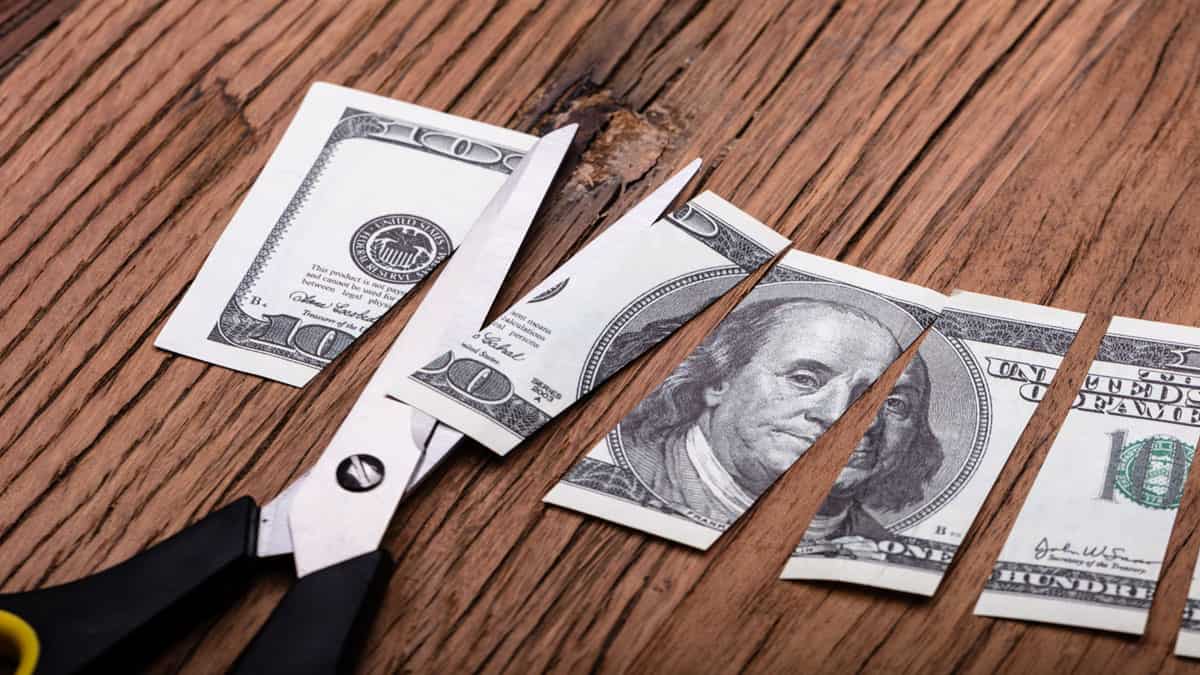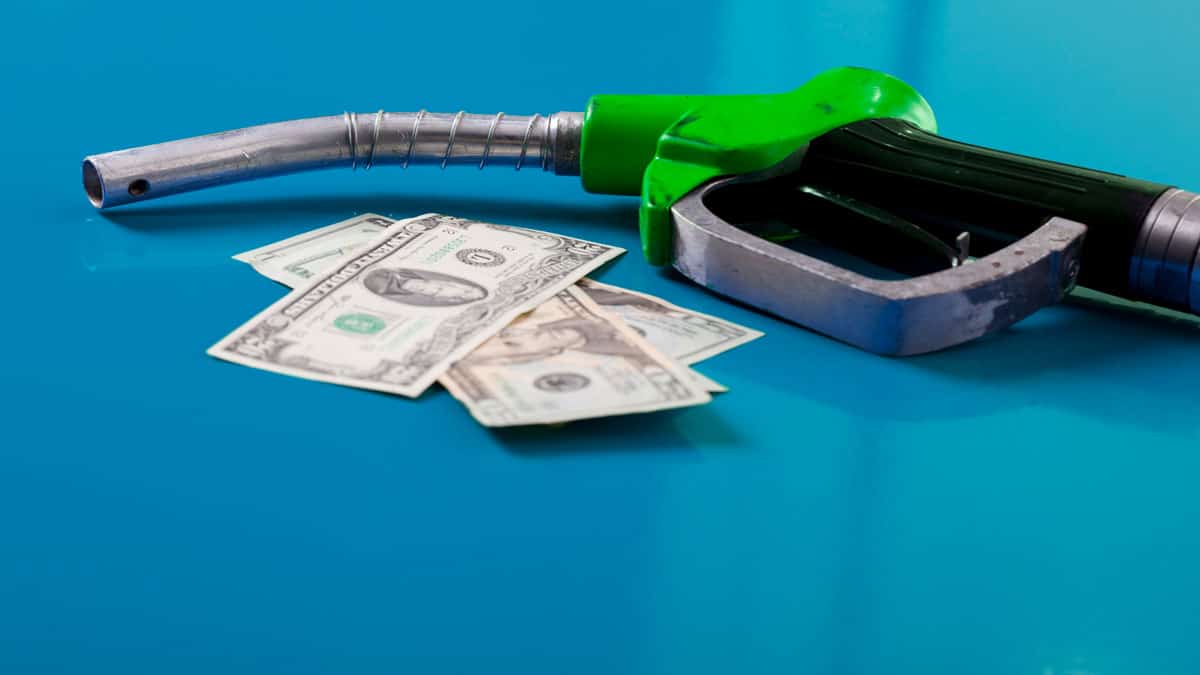THIS POST MAY CONTAIN AFFILIATE LINKS. PLEASE SEE MY DISCLOSURES. FOR MORE INFORMATION.
Are you feeling overwhelmed by your finances?
Do you feel like it’s time to get back on track but don’t know where to start?
Stress no more.
We’re about to embark on a financial journey centered around recognizing the common missteps made in managing money and understanding the tools needed to recover from them.
Our goal is simple: equip you with the knowledge and resources to recognize when things are veering off course and take corrective action so that money matters become less of a burden.
We’ll dive deep into the 16 key red flags indicating you may not be optimally navigating your budget.
Afterward, make sure to check out our comprehensive guide outlining tips for getting back on track.
Let’s hit the highway!
#1. Asking for Money You Won’t Repay

Asking for money can be embarrassing, but some may only need to do it a few times when struggling.
However, others out there will consistently ask to borrow with no intent to repay, even if they say they will.
Worse still, they’re making poor financial choices with this money and continuing to engage in habits that threaten their own finances and leave them in a cycle of borrowing and never actually repaying.
#2. Spending Money Because Of Money You “Will” Have

One of the biggest warning signs that you’re going off track financially is when you start spending money because of income or refunds you “will” have in the future.
This usually happens when people assume they will receive more money than they end up actually getting.
Rather than relying on this hypothetical income, it’s important to ensure your expenses are covered by what you currently have.
If you find yourself spending money because of income that’s not yet in your possession, it’s important to take steps to get back on track and live within your means.
#3. Making Impulse Buys Right After Payday

Having adult money can be exciting, but it can also be quite tempting.
Plenty of people will get their paycheck without thinking twice about spending it on things they want without saving it first or spending it on bills they need to pay.
Whether it’s for a hobby or a product that they won’t even use, those who are financially irresponsible show their true colors when they get paid and immediately start ordering things or shopping for items that will only set them back further.
#4. Quitting One Addiction for Another

People with less money are allowed to enjoy things, but some might become addicted to certain things.
In this instance, cutting it out completely could be the right course of action.
An excellent example of this is people who have a problem with alcohol.
But sometimes, rather than taking advantage of the fact that they’ve cut out addictions and managed to save money, they’ll instead spend that money on a new addiction that leaves them in the same financial position they were in.
#5. Investing in a Business or Side Hustle Without Doing Research

It’s hard to get by with a full-time or part-time job these days, so many will turn to small businesses and side hustles to generate income.
But while there are plenty of success stories, an equal number of individuals will dive in without the proper research.
Plenty of financially irresponsible people will buy all the materials, think that they’re somehow going to be able to start a business, and fail because they haven’t met any of the prerequisites needed to get off the ground.
#6. Prioritizing the Wrong Things in Your Budget

Have you ever had someone complain about having no money yet buying non-essentials?
One person describes how they had someone who would complain that they couldn’t afford shoes for their children but would end up with custom rims and wheels on their cars.
If that doesn’t scream financially irresponsible, I don’t know what does!
#7. Having High-End Everything But Always Being Broke

Being poor is expensive.
Even if some products seem cheaper, the reality is that they break more often and cost you more over time.
This is why an argument can be made for investing in higher-quality products.
However, those who make bad financial decisions may invest in high-end everything, even if they don’t need it.
#8. Spending Available Funds on Vacations

Some examples are hyper-specific.
One person talked about a family who didn’t have enough money for new tires (and other essentials), so he got another family member to pay him for remodeling work that she needed to be done around the house.
But does he spend that money on new tires?
Of course not.
Instead, he takes the money he earned from that work and spends it on a vacation to New Orleans!
#9. Can’t Pay Rent But Always Partying

Rent is one of the significant expenses, and it would stress the average person out tremendously if they found themselves short right before it was due.
But people who like to party? Absolutely not.
Many people recount friends and family who never had enough money to make the rent but would somehow be able to scrounge up enough to engage in their favorite pastime.
Not only is this irresponsible, but the consequences can be dire compared to skipping out on other expenses.
#10. Struggling But Always Getting Food Delivery

Gig apps like Uber Eats made it easier than ever for you to get your hands on your favorite fast food.
However, it also created a trope about the person who’s constantly struggling yet has enough to order takeout every day consistently.
This wouldn’t be a trope if it weren’t a common issue.
Numerous people will complain that they won’t have enough money but will spend a ton on food delivery apps, all of which cost you more than if you were to get it yourself.
#11. Only Knowing Monthly Amounts But Not Total Payment

This is generally about people who buy cars without thinking about it.
If you ask someone how much a car costs, they’ll likely give you the full amount.
Others who are financially careless or clueless will not.
Instead, they’ll reply with the amount they’re paying monthly, which is often quite large because they’re being overburdened with high-interest rates and paying way more than what the car is worth.
#12. Overspending on Cars That Are More Than Functional

You don’t always need the nicest things, but some people do.
Rather than spending their money responsibly on a car that does the job and gets them to where they need to go, some will buy an extremely nice car that costs them more than they actually make.
That’s a recipe for financial disaster!
#13. Getting Tattoos Religiously

Likewise, you might know someone who always seems to have money for tattoos.
There’s nothing wrong with tattoos, but they’re often expensive, especially if you get a good amount of your skin inked.
Some people will spend a ton on tattoos but never have enough for other expenses, leading people to wonder why they’re spending their money on a tattoo instead of looking for ways to earn more money to pay for the tattoo.
#14. Settling For Just Enough Money To Get By
Another sign you may be headed toward financial trouble is if you are only settling for the amount of money that allows you to get by.
Living paycheck-to-paycheck can be a dangerous habit, and it’s important to find ways to make sure your income covers more than just the basics.
It’s important to establish a budget and stick to it so you can start saving money for emergencies or future purchases.
While having a budget may initially seem daunting, many online tools can help make the process easier and less time-consuming.
You may also want to consider cutting back on certain expenses, if necessary, such as eating out or going on expensive vacations.
#15. No Emergency Fund

Another common mistake is not having an emergency fund.
An emergency fund is a savings account that you can access in the event of an unexpected expense, such as a medical bill or car repair.
By setting aside money for emergencies ahead of time, you won’t have to rely on credit cards or take out loans to cover these costs.
#16. Savings? What’s That?

Many people make the mistake of not saving for their future.
Whether it’s putting money away in a retirement account, or simply setting aside some cash each month for a rainy day, having a nest egg can help you weather economic hardships and provide greater financial stability down the road.
Making regular contributions to your savings can also help you take advantage of compounding interest, allowing your money to grow faster.
21 Habits Of Wealthy People

Do you what separates the wealthy from everyone else? It’s their habits.
The good news is learning their habits is simple which means with a little effort, you too can become wealthy.
Slash Your Monthly Bills

With inflation rising, your monthly bills are likely getting out of control. Luckily, there are some simple steps you can take. Use this guide to help you save up to $7,000 a year on your monthly bills.
SLASH YOUR MONTHLY BILLS AND SAVE
Best Gas Hacks For Free Gas

You’ve probably wished you could get free gasoline, but thought that was impossible. But the reality is, it isn’t impossible.
There are many free gas hacks you can use to save money on fuel ups. Here are 15 ways to lower the cost of gasoline, and in effect, get free gas.
15 FREE GAS HACKS YOU NEED TO TRY
Save Money On Groceries

It’s no secret that grocery shopping is a significant expense every month. While most of us know a few ways to reduce this bill, there are many other simple things we can do.
Learn the easy tricks to spend less on groceries and pocket some savings.
LEARN HOW TO SPEND LESS MONEY ON GROCERIES
How To Save Money

If you want to get ahead financially, you need to put some money into savings on a regular basis.
Unfortunately, many of us never do. But that changes now. Here are over 100 simple things you can do to start saving money every day
This thread inspired this article.
I have over 15 years experience in the financial services industry and 20 years investing in the stock market. I have both my undergrad and graduate degrees in Finance, and am FINRA Series 65 licensed and have a Certificate in Financial Planning.
Visit my About Me page to learn more about me and why I am your trusted personal finance expert.


